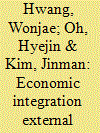|
|
|
Sort Order |
|
|
|
Items / Page
|
|
|
|
|
|
|
| Srl | Item |
| 1 |
ID:
135072


|
|
|
|
|
| Summary/Abstract |
Purpose—This article explores the politicization of North Korean human rights in US. foreign policy and the emergence of two different networks addressing suffering inside North Korea.
Design/methodology/approach—Drawing on evidence from primary and secondary accounts, interviews with human rights activists, and participant —observation at thirteen North Korean human rights events in Washington, D.(I., 1 trace the evolution of human rights action and discourse from the 19903 to the present
period.
Findir1gs—Short~ and long—term strategic goals interacted with different moral and principled beliefs, thus resulting in two different policy—activist networks working to alleviate the plight of North Koreans. One group stressed continued humanitarian engagement with North Korea. A second network emerged, shifting their focus towards advocacy and awareness, demanding greater political rights and freedoms for North Koreans.
Practical 1mplica1ions—This article helps identify different cleavages and areas for convergence for activists, practitioners, and policymakers when addressing North Korean human rights.
|
|
|
|
|
|
|
|
|
|
|
|
|
|
|
|
| 2 |
ID:
135070


|
|
|
|
|
| Summary/Abstract |
Purpose—Despite the tension between North Korea and South Korea, tourists from China and other countries are visiting North Korea at an increasing rate. This article aims to examine the background, development trends and other factors affecting this phenomenon.
Design/Methodology/Approach—Using tourism data from the China National Tourism Administration, local reports and the news, this study attempts to analyze the growing trend of Chinese tourists to North Korea.
Finding —The results provide substantial support for the authors’ conclusion that it is possible Chinese tourists to North Korea will continue at increasingly higher rates in the coming years. Non—Chinese tourists to North Korea are also increasing. Practical 1mplications—This study provides evidence that North Korea is becoming more open and active in the tourism business, a sign that North Korea is changing its economic policy.
|
|
|
|
|
|
|
|
|
|
|
|
|
|
|
|
| 3 |
ID:
135059


|
|
|
|
|
| Summary/Abstract |
Purpose—This study examines whether economic integration between South and North Korea has promoted political cooperation and whether external forces are still a dominant factor in explaining their behavior. Design/methodology/approach—This study is based on a quantitative analysis of roll call data in the United Nations General Assembly (UNGA) between 1991 and 2011. Vote coincidence between South and North Korea is examined. Findings—Empirical results show that economic integration does not generate significant effects on cooperation between the two Koreas, while their vote coincidence is strongly influenced by the political positions of the U.S. and China. Meanwhile, the two Korea’s tend to agree on economic issues but show dissimilar voting patterns over nuclear, security, and human rights issues.
Practical implication’s—The findings imply that economic and humanitarian cooperation between South and North Korea cannot be easily transferred to political cooperation in other areas without drawing support from powers such as the U.S. of economic integration on cooperation, efforts to reduce the North’s security concerns resulting from asymmetric dependence need to be followed.
|
|
|
|
|
|
|
|
|
|
|
|
|
|
|
|
| 4 |
ID:
135068


|
|
|
|
|
| Summary/Abstract |
Purpose—This article investigates how international cooperation and structural changes in the Northeast Asian logistics market can effect economic and political change in North Korea. Design/methodology/approach—The authors survey the historical background of Russia and China in the northern economic bloc, examine the current status of the northern logistics market in Russia, China, and North Korea, and analyze the structural changes of the northern logistics market in the areas of multimodal services, railway networks, and the northern sea route. Findings—— international cooperation and structural changes in the northern logistics network system will foster economic growth, reform, and opening—up in North Korea, with the prospect of economic prosperity and political stability in the Northeast Asian region.
|
|
|
|
|
|
|
|
|
|
|
|
|
|
|
|
| 5 |
ID:
135064


|
|
|
|
|
| Summary/Abstract |
This article draws on literature, media reports official Mongolian press releases and statements and a number of informal interviews and discussions with Mongolian policymakers and politicians.
Mongolia’s unique relationship with and access to the DPRK’s leadership has primarily proven to be a most valuable asset in boosting Mongolia’s profile in the region and the world at large. Whether Mongolia can spearhead a regional security mechanism, as suggested by both Mongolian politician and international analysts remain to be seen.
|
|
|
|
|
|
|
|
|
|
|
|
|
|
|
|
|
|
|
|
|